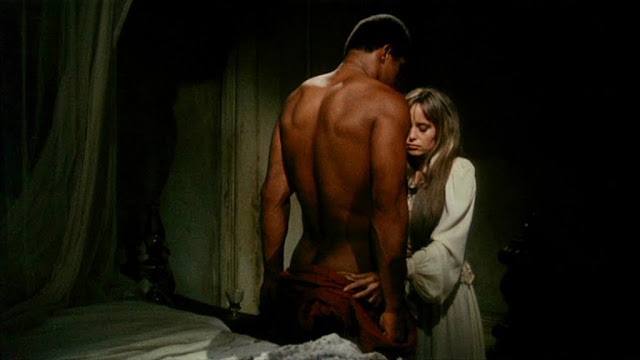| RATING: | 80% |
| FORMAT: | DVD |
Fine film about the essential degeneracy of White culture, especially as regards their sex and money fixations.
Everyone here has their price; leaving no room for love or friendship or trust. The essential metaphor here is of a stud farm, where the only two purposes of sex are breeding and/or relief for both Blacks and Whites.
Uppity Whites parade as the genetic superiors of Blacks to conceal the deep-seated sexual insecurities caused by the fact that White supremacy means not being able to choose one’s true love: Arranged marriage being the dominant, but denied, form of legalized sexual relations among White Christians.
The White inability to see others, and each other, as individuals is well in evidence in their desperate drive to categorize human beings into pigeonholes that they cannot be shown to pre-fit, particularly as regards inferior and superior. This essential fact of White culture creates a dramatic problem that is implied - but only partly explored - in that the White characters are aspects of groupthink, not individuals in themselves, although we see some Whites struggling to achieve an individuality denied them by their culture’s emotionally repressive social imperatives.
One of the things that’s most disturbing about the film is the depiction of the consequences of slavery, racism and hypocrisy of Wwhites, how it warps son, Perry KING’s natural tenderness towards Brenda SYKES into a horrifying insecure paranoia that evolves into aberrantly exaggerated jealousy and sexually-motivated violence. And poor Susan GEORGE’s character is driven totally mad by her husband’s neglect and jealousy and the seemingly-contradictory tender erotic ministrations of slave, Ken NORTON.
The fragility of a White culture based on a genetic fallacy is implied in the fact Whites clearly recognize the humanity of Blacks - hence their fear of slave rebellions - while trying to deny the meaning of such rebellions (the human desire to be free) in the severity of the response to such drapetomania. This is also suggested by the Southern Gothic look (but not feel) of the interior scenes in their suggestion of wealthy emptiness and loveless satiation.
Here, the crime is its own punishment. Why would Whites create a culture so debased that they can achieve no personal satisfaction from it other than by debasing the bodies of others and, in the process, their own, in a desperate attempt – like the sadistic child pulling off the wings of flies – to achieve psychological fulfillment through physical violence? For Mandingo is a film about bodies: Bodies as commodities, bodies as skin color, bodies as objects and subjects of desire, bodies as instruments and recipients of violence. The characters here are limited to only understanding themselves as bodies: Doomed to be forever wanting, and never getting, more. The jarring tenderness of the scenes of miscegenation are complex and intense without being exploitive. The characters are attempting to escape their stifling social order (while tempting the viewer to do likewise) as the bodies of the four leads - Perry King, Brenda Sykes, Susan George and (especially) Ken Norton are eroticised by the camera and served up before the viewer as icons of unfettered sexuality and joyful celebration; ironically presided over by the decaying body of James Mason’s aging patriarch. They fail because their relationship are literally and metaphorically only skin-deep, so steeped in moral corruption are they – like the man who thinks sitting in a room full of spiders will cure him of arachnophobia.
The damned-if-you-do; damned-if-you-don’t mentality imposed on everyone by Whites is well-presented, yet the all-important justification for the Black Holocaust is entirely absent; making it difficult not to see the modern-day parallels to the White behavior displayed here since the attitudes shown are devoid of historical context and thus still relevant.
The real achievement of this film is the matter-of-factness of the cruelty and its casual and normalized nature in the minds of Whites who had also come to see each other as cattle in their breeding/marriage customs. As a description of a descent into a White hell, only a movie like Salo beats it. Unlike, the US tv-series Roots or Holocaust, there is no attempt to deny the basic hypocrisy (eg, White women are sluts if they enjoy sex) and schizophrenia (eg, Blacks are labeled inferior yet feared) of Whites nor to suggest that White supremacy is somehow unusual or deviant from White norms. Lacking melodramatic tricks, the accurate and historical facts of the matter are clearly laid out in fictional form to emphasize the fact that while White behavior changes, their attitudes do not.
A brilliant antidote to the attempt to hide the truth that is Gone with the Wind (although inferior to The Chant of Jimmie Blacksmith) and an excellent example of one of the many skeletons that Whites would prefer were left in the closet of their history. Like The Godfather, there is no way that this movie could be anything other than nasty and brutish in its content. Moreover, the White world is locked into a spiral that can only end in self-annihilation, yet is actually cathartic in portraying something against which everything else seems an improvement.
